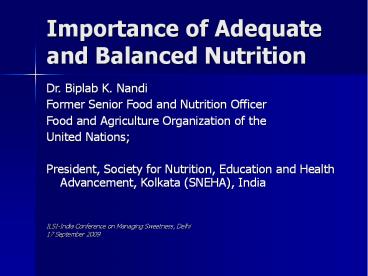Importance of Adequate and Balanced Nutrition - PowerPoint PPT Presentation
Title:
Importance of Adequate and Balanced Nutrition
Description:
Importance of Adequate and Balanced Nutrition Dr. Biplab K. Nandi Former Senior Food and Nutrition Officer Food and Agriculture Organization of the – PowerPoint PPT presentation
Number of Views:83
Avg rating:3.0/5.0
Title: Importance of Adequate and Balanced Nutrition
1
Importance of Adequate and Balanced Nutrition
- Dr. Biplab K. Nandi
- Former Senior Food and Nutrition Officer
- Food and Agriculture Organization of the
- United Nations
- President, Society for Nutrition, Education and
Health Advancement, Kolkata (SNEHA), India - ILSI-India Conference on Managing Sweetness,
Delhi - 17 September 2009
2
Overview
- Food and Nutrition Security
- WFS and MDGs
- Key to Balanced Nutrition
- Nutritional SituationAsia and World
- Double Burden of Malnutrition
- Food Based StrategiesDiversified Food Basket
- FAO Projects in support of Balanced Nutrition
- Concluding Remarks
3
Food and Nutrition Security
- Four Dimensions of Food Security
- Nutritional Security
- Household Food Security
4
WFS and MDGs
- WFS
- MDG 1 and other 7 MDGs
5
Millennium Development Goals
- Eradicate extreme poverty and hunger
- Achieve universal primary education
- Promote gender equality and empower women
- Reduce child mortality
- Improve maternal health
- Combat HIV/AIDS, malaria, and other diseases
- Ensure environmental sustainability
- Development a global partnership for development
6
Four Key to Balanced Nutrition
- Food Based Dietary Guidelines
- Macronutrients
- Micronutrients
- HydrationSafe drinking water
- Plate MethodFor portioning daily diet
7
Suggested Portioning of Diet
- 50 of total calories from CHO
- 20 of total calories from fats
- Emphasis on Monounsaturated fats olive, saffola
etc. - Green Leafy Vegetables
- Assorted Vegetables
- Fruits
- 6-8 glasses of water
- Protein (more of milk and milk products and
pulses) - FishHighly Recommended
- Whole grains (Brown rice)
8
Important Considerations
- Access to safe and adequate nutritious Foods
- Four dimensions of Food and Nutrition Security
- Dietary Diversification and Food based approach
- Balancing Calories and Consuming Wide Variety of
Foods - Food for Balanced Nutrition and Health
- Promoting Nutrition, right from the childhood
- Life Cycle Approach
9
FAOs Mandate (founded in 1945)
Raise levels of nutrition and standards of
living Improve agricultural productivity Bette
r the conditions of rural populations Contribute
to the expansion of the worlds economy
10
Prevalence of undernourishment
Source FAO, SOFI, 2008
11
Prevalence of undernourishment, South Asia
(Data NA for Bhutan, Maldives)
Source FAO, SOFI,2008
12
World Nutrition Situation
- IDA affects more than 3.5 billion people
- VAD 3.3 million U5s with clinical VAD and 75-140
million U5s with sub-clinical VAD - IDD 740 million people affected by goitre
13
Global Malnutrition SituationA Paradox
- FAO 848 million undernourished
- WHO 300 million obese adults
- and
- 115 million people in developing
countries suffering from obesity-related
conditions
14
Double Burden of Malnutrition
- A real Paradox
- Undernutrition
- Diet related chronic diseases due to over
nutritionDiabetes, CHD, Some forms of Cancer - Managing both through diet
- Adequate and Balanced Nutritionthe key
- Physical Activity
- Healthy Lifestyle
15
ICN, WFS and Millennium Summit
- ICN World Declaration of the Plan of Action for
Nutrition including combating Hidden Hunger led
to developing National Plans of Action for
Nutrition (NPANs) - International Alliance Against Hunger (IAAH)
- MDGs included nutrition and health as one of the
cornerstones of development. - Greater investment in nutrition linked
agriculture and development strategies leads to
improved health, in particular, has beneficial
effects on next generation.
16
FAO projects and Lessons Learnt in Asia
- Bangladesh
- Bhutan
- Cambodia
- China
- India
- Indonesia
- Lao PDR
- Nepal
- Philippines
- Sri Lanka
- Thailand
- Viet Nam
17
Role of FAO in support of food based strategies
- Facilitates process for promoting supply, access
and consumption of adequate quantity and quality
of safe foods - Primarily advocates dietary diversification and
fortification - Recognizes need for broad based supplementation
(high risk areas) and public health measures - Improve both micronutrient and overall
nutritional status
18
Share of food groups as percentage of
DES(kcal/caput/day)
Adapted from FBS, 2001
19
Recommendations and Conclusions
- Promote Nutrition Orientation to Food Production
by incorporating nutrition considerations into
development policies and programmes and
agriculture in particular, including poverty
reduction strategies - National Food and Agriculture Policy to
aim/strengthen achievement of balanced production
and availability of a range of diverse foods
20
Adequate and Balanced Nutrition
- Farm and not Pharmacy, approach
- Diversified Food Basket for Balancing Calorie
Intake and Dietary Diversification
21
Concluding Remarks
- Reference to National RDA and Food Pyramid
- Limiting Sugar Intake
- Eating more Whole Grains
- Avoiding Trans fats
- Limiting Saturated Fat Intake
- Eating 20 to 35 of daily calories from Fats
- Consuming monounsaturated and poly unsaturated
Fats - Ensuring Safety of Foods
22
An Old Chinese Proverb
- REGARDLESS OF WHO THE FATHER OF A DISEASE
IS - SURELY ITS MOTHER IS
- IMPROPER DIET
23
Another Saying
- Let Food be Our Medicine
24
Contact
- nandi.biplab_at_gmail.com
- President
- Society for Nutrition, Education and Health
Advancement (SNEHA) Kolkata, India
25
- THANK YOU
- For Your Kind Attention































